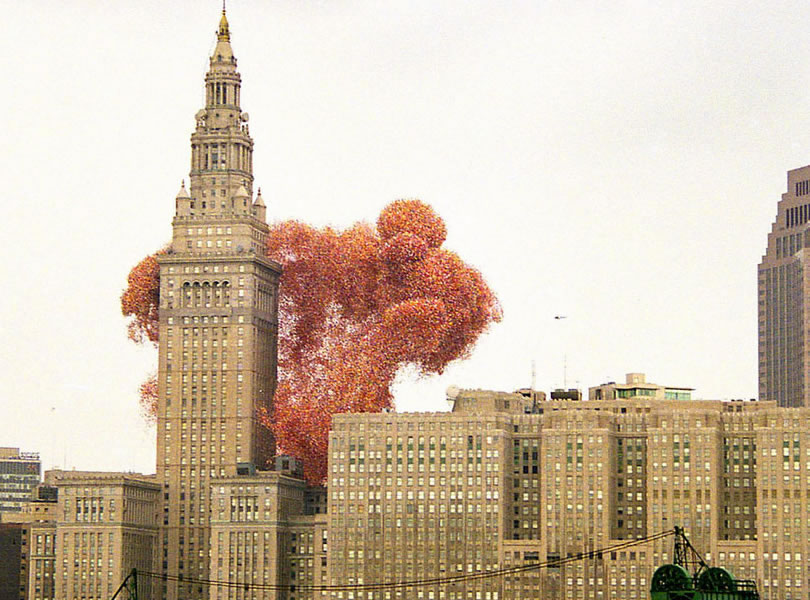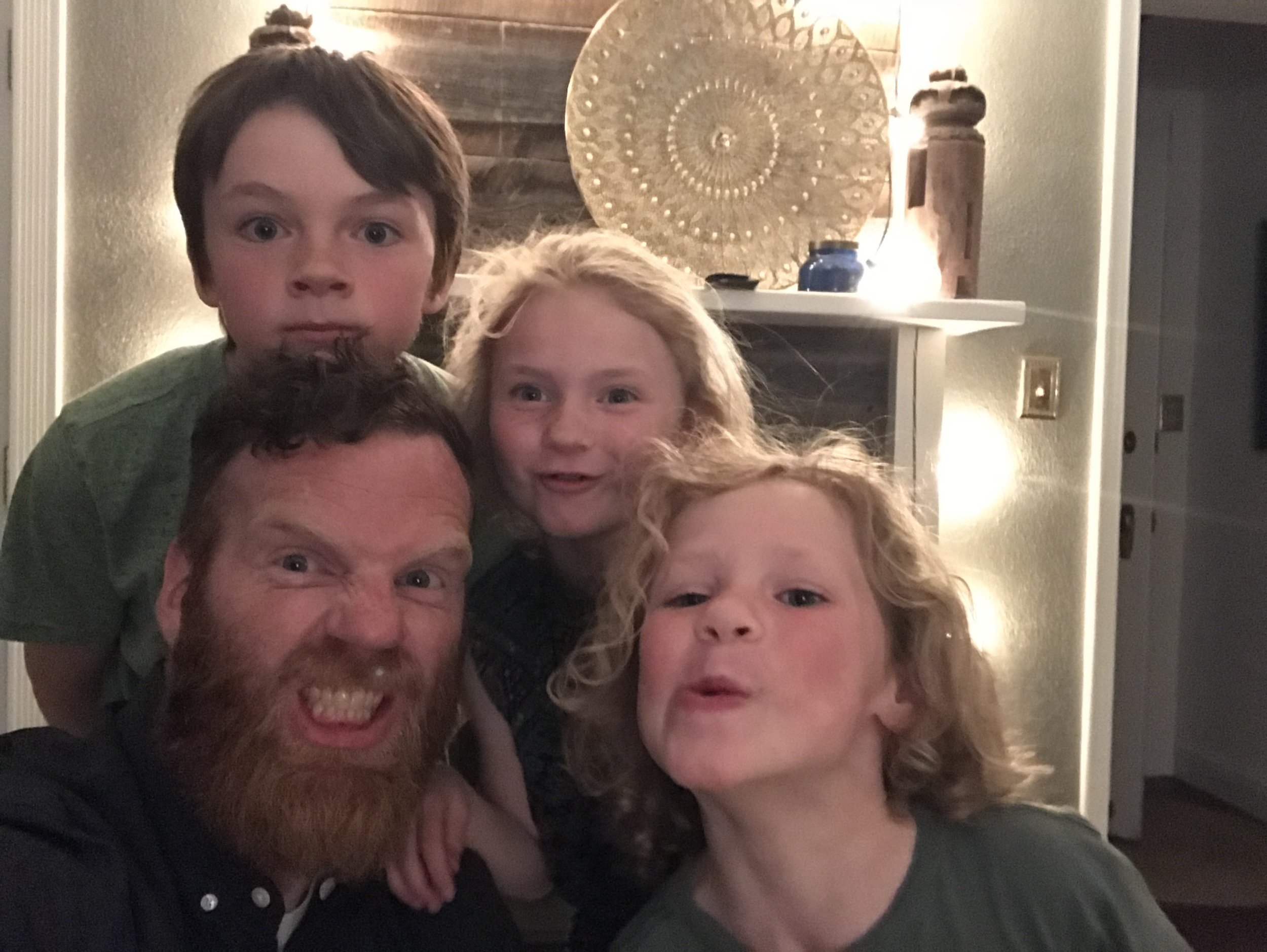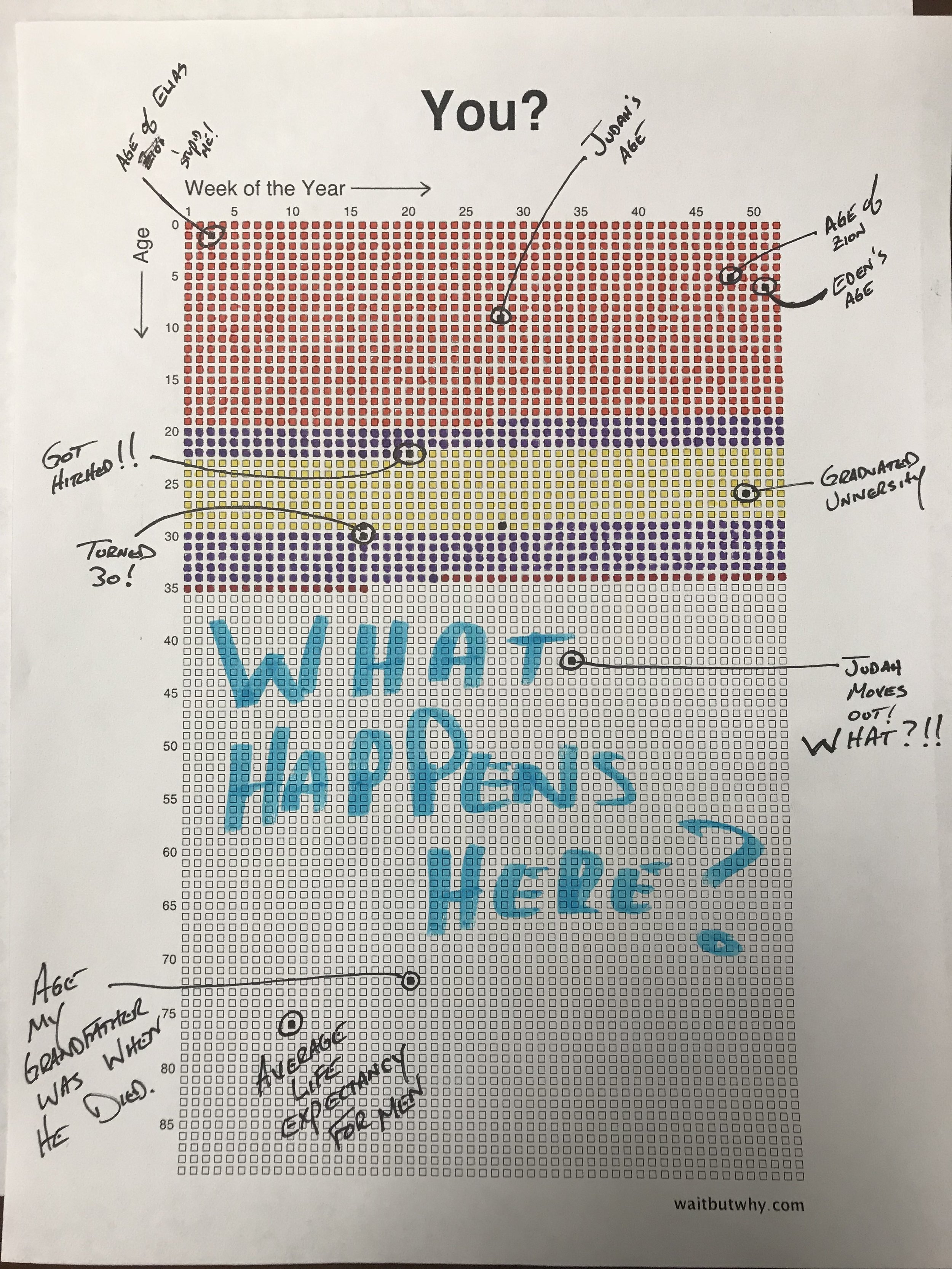I’ve mentioned before how discipline has the potential to draw in our struggling and most difficult students, but what about when we struggle? What about those moments when we lose our cool and don’t act with perfect love and patience? What happens then?
Our first response might be to defend ourselves, blame our students or just “chalk it up to a bad day,” because it’s easy and natural to want to mask our failures and imperfections with excuses and defensiveness because nobody likes to be perceived as weak or incapable. But when we do, when we choose to lift up and defend ourselves over another, we sacrifice the opportunity of teaching one of the greatest lessons life has to offer. Mainly, what it means to fail, to ask for forgiveness, and then to rest in the beauty of reconciliation. We miss out on teaching our students (and reminding ourselves) of what it means to be human.
After showing the provocative music video, “This Is America” by Childish Gambino to the class, we spent some time dissecting its many symbols and themes and discussing the perspectives and ideas of Mr. Gambino. We talked about race and guns and the art of expression. We talked about the Jim Crow era and related it to the recent Starbucks and Yale incidents. We wrestled with the concept of reality and the power of perspective. Then we watched my favorite scene from Men In Black.
Shortly after Will Smith’s character is confronted with the reality that aliens do in fact live on this planet, the movie cuts to him and Special Agent K (Tommy Lee Jones) sitting on a bench, over looking the Hudson River and the iconic Twin Towers.
“1500 years ago,” Special Agent K says, concluding their conversation, “we knew the earth was the center of the universe, 500 years ago we knew the earth was flat, and fifteen minutes ago you knew humans were the only species on this planet. Imagine what you’ll know tomorrow.” We then talked about what we know and how we know it and how that relates to stereotypes and prejudices and the fallibility of reality.
It was shaping up to be a fantastic lesson.
“So,” I said, sitting on the table in front of the class, “With this in mind, is Childish Gambino wrong?” I asked.
“No,” they responded.
“Is he right?”
“No,” they said again.
“Then what is he?”
“Both.”
“Exactly.” And I privately gave myself a pat on the back, “You’re killing it B-Mill!”
Then all hell broke loose.
As a teacher who has gained the respect of most of my students, I’m pretty used to kids tracking with my lesson plans and accepting most of what I have to say – even if they don’t necessarily agree with it completely. However, every now and then, one student takes it upon him or herself to challenge me. And today, it was the confident kid in the far back corner, the one who doesn’t say much but always has an opinion.
“That’s bull,” he said, and the whole class turned.
“What?” I said, more shocked then anything.
“That’s bull,” he said again, “America isn’t like that.” He then went on to explain why he thought Gambino was unfair and his interpretation of America false, because “Racism isn’t that big a deal anymore.”
“What are you talking about?” I yelled, “How can you say racism isn’t a big deal, it’s a HUGE deal!!!”
When he didn’t believe me, I went after him, because he was wrong and he needed to know it. He needed to take a lesson from Special Agent J and realize what he thinks he knows isn’t reality. When he argued again, I got louder and challenged his sources, his lack of experience, “You’re only a freshman,” I said, “How much of the world have you seen?” and then I picked apart his argument word by every friggen word until, eventually, I won. Or rather, until he sat back in his chair, arms crossed, and stopped talking. Then the bell rang.
On his way out I tried to make amends. “Hey,” I said, waiving him over.”
He came, reluctantly.
“I appreciated you speaking up today,” I said, “Please keep doing it.” I stuck my fist out for our usual fist bump because he wouldn’t look at me and I wanted to make sure everything was okay. It wasn’t.
“Brother,” I said as we walked towards the door, “you gotta be willing to see things from a different perspective. You’re reality isn’t complete.” He still wouldn’t look at me and I could tell he just wanted to go, but I kept at it. I kept talking and not listening. I kept arguing, even though he wasn’t saying anything.
Finally, he turned, “I respectfully disagree,” then picked up his pace and headed to his next class. The door clicked shut behind him and I knew I had failed, that my words no longer had merit, and that I had lost him. All because I knew I was right.
That night, with my kids finally tucked into bed and my wife working on the couch next to me, a sort of sickness swirled in my stomach. I tried to write, to lesson plan, to grade papers, to watch YouTube videos, but I couldn’t. I couldn’t stop thinking about the day’s class and the example I had set.
I thought of how the entire year’s worth of building trust and arguing for the power of stories and the need for kindness had all come crashing down in less than ten minutes. I thought of all the times I prided myself as an open-minded guy who loves and embraces everyone. I thought of my “Dialogue not Monologue” speeches, of how we spent a week discussing Chimamanda Adichie’s perspective on single stories and stereotypes – “the problem with stereotypes is not that they are untrue, but that they are incomplete. They make one story become the only story” and how those words had become the anthem to our year, in everything we read or watched or discussed. And my stomach churned because, suddenly, all that was just words and ideas that didn’t really mean a thing. Because I had failed to make any of it come to life, to make it tangible and alive, in the classroom, where they could see it and hear it and experience it.
Because I cared more about what content then I did about the person.
“Agh,” I moaned, shooting up from the couch and not really knowing where I was going or what I was doing.
My wife jumped, “What?” she asked, a bit startled, “What’s wrong?”
I told her about my student and how I responded. She listened, asked a few questions, then said, “Why don’t you just apologize?”
Because I’m the teacher was my first thought and because I’m not wrong was the second. But then, after a moment, it hit me, because you are the teacher, you are wrong.
I was wrong because I didn’t put into practice what I had so desperately wanted my students to learn: be willing to hear and see things from another’s perspective. And I was wrong because I had treated my student with less respect than he deserved, all because I disagreed with him, because I knew I was right. I was wrong because I chose to be right rather than to do what was right. My good friend, Erik Beard taught me that.
Erik and I have been friends for almost 20 years, and for the first ten or so, we were close. We traveled the country together, played music from Shel Silverstein books, battled in sports, and made thousands of campfires together. We even argued. But, like many of the discussions in my English classroom, we argued about things that were at a distance and outside of ourselves. They weren’t immensely personal, more philosophical. Until suddenly, they weren’t.
I don’t remember exactly what Erik said, I just know it was personal and, for whatever reason, offensive. I remember too that I didn’t say anything at first, I just fumed. For days. Until I couldn’t take it anymore. Then, I called him up “Brother,” I said, “We need to talk.”
“Sure,” he said, “When?”
We decided to meet the next morning at our usual diner. I got there early with my journal that was packed full of thoughts and arguments and as I waited, I read them over and over. When he finally walked in, I was ready.
How we started the awkward conversation isn’t clear, but judging from how I’ve handled similar situations in the past I can only assume we dove right in. I probably didn’t even let him order a coffee. What I do remember though is me laying into him and explaining, with acute detail, why he was wrong in what he said, how he said it, and when he said it.
At first, he argued a bit, defending his intentions and clarifying his position, but I wouldn’t hear it because I had my journal, my thoughts, and a clear defense. Eventually he just sat there, listening and occasionally clarifying.
When I was finished, he calmly said, “I’m sorry.” Then, “I hear you. I don’t fully agree with you, but I hear you.”
That was it. No argument, no defense, and no excuse. Just, “I’m sorry.” And it completely disarmed me.
I remember the short pause of silence, the waitress filling our coffee cups, and me closing my journal. I also remember that that was when we started to have a discussion, when we looked at each other and acknowledged, “We’re on the same side” and began working through the pain and frustration of what happened. That’s also when I learned I could trust Erik with anything, that he was safe, and that he wasn’t really concerned about being right, but rather, doing what was right. He chose me over what he knew. And over the years, that has made all the difference.
So the next day, after the students filed in and took their seats, I walked to the front of the class, sat on the table that sits below the whiteboard, and asked, “What was the point of the video from yesterday?
“To spark an argument,” someone whispered.
“To listen to and see things from another’s perspective,” another student said more confidently.
“Exactly,” I said, pointing at the latter, “That was what I had hoped for, but because of how I responded to my man,” and I pointed to the student, “I ended up sparking an argument and doing exactly what I was asking you guys not to do.” I looked around the class as my heart began to race. Everyone was looking straight at me. “And because I challenged him in front of you all,” I continued, “I need to also say, in front of you all,” and I waved my hand over the entire class, “that Student,” and I looked straight at him “I’m sorry. I took advantage of my position as a teacher and I was unfair to you as a person.”
He stared back at me. The class went silent.
“I disrespected you,” I said, “and I wasn’t kind or respectful to your perspectives. I apologize. Will you forgive me?”
“Yes,” he said, “Me too. I got angry too.”
“Are we good?” I asked.
“Yeah,” he said, “We’re good.” Then class continued, and to be honest, I don’t really remember what we covered that day. And to be even more honest, I don’t really care because I don’t think it really mattered. There were greater things going on.
When class was over, I met the student by the door, “Thank you,” I said.
“Thank you,” he said, lifting his fist for a pound.
I think what’s most frustrating about being a teacher is that not every student will agree with what I have to say, with the lessons I’m trying to teach, or how I perceive the world to be and the changes that need to happen in order to make it better.
Some kids leave my class still insensitive, still ignorant of the plight and difficulty of the many lives that surround there own, and still completely absorbed in satisfying their own self-interests, and that frustrates the hell out of me. If I can’t get kids to think, if I can’t get them to be better people and contributors to society, what am I doing? Why am I wasting my time?
It’s easy to get discouraged when, at the end of the day, the week, and sometimes even the year, it seems like not enough change actually happened.
But then I remember Mr. Furman.
During my senior year, while scraping by with a 1.75ish GPA, my English teacher, Mr. Furman, read my short story journal entry to the class and said, “Brian, you are a good writer.” It didn’t matter much then, but almost five years later, while in California and sitting on a blanket in a sea of freshly cut grass with my new fiancé by my side, his words suddenly floated to the surface and challenged everything I’d known about my direction in life. That next semester, I transferred into the English Ed. Program.
My students may never remember the essay questions surrounding the life and death of Lenny from Of Mice and Men. They probably won’t recall the songs we annotated or the videos we unpacked, and I can almost guarantee that none of them will miss filling out the infamous PDP notes.
But they might remember the days we wrestled through failure, forgiveness, and all that other human being stuff.
They might remember, even if it’s many years from now, how they had a teacher who wasn’t afraid to be wrong, to admit their fault, and who consistently chose them – the students – over himself.
They might remember a classroom of freedom and safety and authenticity, where they could wrestle with ideas and failure and grow and learn without fear of ridicule, and when they do, hopefully, they will pull their heals out from the ground, care less about speaking than they do about listening, and do what is right.
But even if many of them don’t, even if I never hear from them or see how much they’ve changed and grown, I choose to believe that at least a small percentage of them will and are because, as a teacher, I choose to believe in hope, in the example of Mr. Furman, and the reality that education isn’t simply about what they score on the test today, but rather, what they will know tomorrow.
You know, the good stuff. The life stuff. The human being stuff. The reason we chose to be teachers stuff.
For more on . . .
-N- Stuff : Education : If school was like rock climbing : Metric Fixation : how standardized data impedes classroom innovation


























